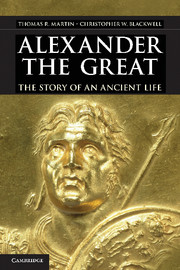Book contents
- Frontmatter
- Contents
- Acknowledgments
- Introduction: The Goal of this Book
- Map 1: European Greece, Macedonia, and Northern Lands
- Map 2: Alexander's Expedition
- 1 The World of Alexander's Birth and His Education in Literature and Warfare (350s and 340s BC)
- 2 Opportunities and Risks asa Teenager (340s to 338 BC)
- 3 The Danger in Replacing a Murdered Father as King (337 to 335 BC)
- 4 The Opening Battles Against the Persian Army (334 to 332 BC)
- 5 Finding God in Egypt and Capturing the Riches of Persia (332 to 330 BC)
- 6 Winning the World as King of Asia (330 to 329 BC)
- 7 Murder, Marriage, and Mixing Customs in Afghanistan (329 to 327 BC)
- 8 Victory and Frustration in India (327 to 326 BC)
- 9 Returning to Babylon and Becoming Divine (326 to 323 BC)
- 10 Remembering and Judging Alexander (323 BC to Now)
- Suggested Readings
- Index
7 - Murder, Marriage, and Mixing Customs in Afghanistan (329 to 327 BC)
Published online by Cambridge University Press: 05 November 2012
- Frontmatter
- Contents
- Acknowledgments
- Introduction: The Goal of this Book
- Map 1: European Greece, Macedonia, and Northern Lands
- Map 2: Alexander's Expedition
- 1 The World of Alexander's Birth and His Education in Literature and Warfare (350s and 340s BC)
- 2 Opportunities and Risks asa Teenager (340s to 338 BC)
- 3 The Danger in Replacing a Murdered Father as King (337 to 335 BC)
- 4 The Opening Battles Against the Persian Army (334 to 332 BC)
- 5 Finding God in Egypt and Capturing the Riches of Persia (332 to 330 BC)
- 6 Winning the World as King of Asia (330 to 329 BC)
- 7 Murder, Marriage, and Mixing Customs in Afghanistan (329 to 327 BC)
- 8 Victory and Frustration in India (327 to 326 BC)
- 9 Returning to Babylon and Becoming Divine (326 to 323 BC)
- 10 Remembering and Judging Alexander (323 BC to Now)
- Suggested Readings
- Index
Summary
The satrapy of Bactria (Afghanistan) occupied the northeastern corner of the Persian Empire, as distant from Persepolis as Persepolis was from Macedonia. The Bactrian peoples were toughened by their environment, which was blazing hot on its upland plains, freezing cold in its mountain heights, and largely dry as a bone, except for occasional rivers that gouged channels through rock and sand. In this land, conquest would be hard, and rule would be harder.
To bring Bactria into his empire, Alexander made a remarkable decision in late 329, upon reaching the city of Bactra (today Balkh), the capital of the satrapy and according to legend the most ancient city in the world. Bactra was famous as sacred to the religion of the Persian kings, which is today called Zoroastrianism after its founding prophet, Zoroaster. Zoroastrian believers worshipped Ahura Mazda as the supreme deity of the universe. He was the source of all good, and his worshippers prayed constantly for his victory, for this god was in perpetual battle against evil. Fire was sacred in the Zoroastrian faith, and its priests nurtured flames kept burning and pure in the temples. To pollute a fire was sacrilege, and there was nothing more polluted than a corpse. Accordingly, the people of Bactria did not burn their dead, as the Macedonians and Greeks often did, according to their own notions of respect for the deceased. Instead, the inhabitants of Bactra kept dogs whose role was to eat the dying and the dead, whose bodies were left lying in the streets of the city. They called these animals “Undertakers.”
- Type
- Chapter
- Information
- Alexander the GreatThe Story of an Ancient Life, pp. 113 - 130Publisher: Cambridge University PressPrint publication year: 2012



